
UPDATE ON REVOLUTIONARY STRUGGLE CASE
Day 3, 1/11/1With the repetition of the procedure P. Roumeliotis (defence advocate of K.Katsenos) asked to place his position on the objection for vagueness of the order, before the court publishes its decision. With a detailed and absolutely thorough argumentation, supported by theory but also by legislations, Romeliotis proved that there is an absolute nullity of the order and the call, because the actions the defendant is accused of have not been described and consequently he cannot defend himself, a fact that -besides the articles of the Code of Penal Procedure, which are being violated- it is also a direct violation of article. 6 paragraph 1 of the ECHR (European Convention for Human Rights), according to which a defendant should be informed in detail about the actions for which they are accused. In the particular case, we have a series of actions in which everywhere we have two perpetrators and simultaneously have seven defendants (the total minus M. Beraha) that are accused for complicity! How can the defendant defend himself, when you won’t tell him precisely what he is accused of, when he isn’t placed in the real incidents? These points were also deposited in writing by the advocate.
The public prosecutor especially apologetic and in “the details” absolutely arbitrary. Yes, -he said- law 321 of the Penal Code asks for a precise description of the action, however the order is extremely analytic in its descriptions. As an example, he mentioned that many bullets were found and it goes into an in-depth analysis of each bullet, while it could have only just mentioned the number! The actions appear to have been carried out in complicity and this is enough. Of course, in a few actions indeed seven cannot be accomplices, since two shot, however this does not recommend ambiguity of the order! This concerns the base of the charge, which will be judged on the substance. It will be judged, that is to say, if indeed the defendants carried out the particular actions.
This is a clearly sophistical positioning. Because – to use his example- the problem is not the type of the bullets , but the relation that each defendant has with their possession. And the charges do not only concern the bullets, but also the actions of R.S. and there the defendants are all put in a sack, enforcing the nazi doctrine of collective responsibility, without mentioning who did what. The opinion of public prosecutor -commented P.Roumeliotis- strengthens our own opinion. When two shoot, who are the accomplices? Each individual should have a dedicated role.
We refine the mosquito (meaning the bullets) and we swallow the camel as it is*, he ended!
Afterwards, P.Roupa and N. Maziotis raised the matter of prejudice and hypocrisy of the court, beginning with the statement of the chairman in the previous session, that directly violates the infamous evidence of innocence. We add the relative dialogue:
P. Roupa: The content of the order is not only vague, but simply creates an impression. That is to say, what was said previously, that it is very analytic, simply creates an impression. I want to ask a question: concerning a specific action, the attack that took place in Goudi area against the riot cop van. It is reported over there -it does not say precisely, but if you sit and investigate it- how many gunshots were fired, they are not more than five or six and the attempted homicides are seventeen! Which means, all the cops that were inside! This is metaphysical, not only vague, but also a little metaphysical. That is to say, they tell you that a bullet can be shot and kill three people! It does not mention who participated neither how many were neither how many were needed for every action specifically.
Beyond this, I also want to point out something else. That fact that we come to a trial, this specific trial, the vagueness of the order, the problems that result in relation to that there is no possibility of attribution of specific charges for each one of us and the fact that in the previous session me and comrade Maziotis made a statement concerning that there is a premeditation and that that the decision of our condemnation has been made. That is to say, we have claimed that we will be condemned, we will also be condemned for the leadership, we will be condemned also for the actions (the statement of the public prosecutor tends to this direction, that is to say all this enough in order to condemns us) and there was a statement by the chairman, after our statements, where he said that if we prove, if our innocence is proven… (Chairman: Not if you prove it, if it is proven)… if our innocence is proven we will shout it out… (Chairman: You have nothing to prove). This was considered as a proposal which shows that the court is open to carry out a trial with evidence etc. and that it is a statement of such type. And this was also transferred to the Media. I believe that this is precisely opposite. That is to say, it shows a inclination that we here come from the start as guilty and that we are obliged to prove that we are innocent. That is to say, concerning the actions, as an example, that yes, we have decided we from before that you all carried them out in complicity…
Chairman: Who told you this?
P. Roupa: It was your statement.
Chairman: That is what you say.
P.Roupa: It was your own statement precisely, that we should prove our innocence.
Chairman: It was not said, I repeat, I did not mention such a thing.
P.Roupa: We are not obliged to prove our innocence, the court is obliged to prove who participated here and who participated there.
Chairman: Look, we can we talk until tomorrow morning and i will say mine and you will say yours. But I repeat once more…
P.Roupa: If i misheard…
Chairman: Yes, you absolutely misheard and it was not transferred to the Media like that. Only you understood it like this.
P. Roupa: But it was mentioned word to word, we can ask the journalists, it is recorded…
N.Maziotis: If it is proved that there are innocent individuals -you said- we will come out and shout it out loud. Is this is not evidence of innocence…
Chairman: If it is proved by the procedure…
N. Maziotis: You did not say procedure either. It was precisely like this: if it is proven that there are innocent individuals, we will come out and shout it loud.
Chairman: Of course.
N. Maziotis: This is interpreted as follows, there is only one interpretation: that we are guilty and if it is proved that we are innocent, you will shout it out loud.
Chairman: The interpretation that you give is mistaken…
N. Maziotis: This constitutes evidence of guilt…
Chairman: It is a mistake…
N. Maziotis: Then you did not understand what you said.
P. Roupa: there is no mistaken interpretation. We speak precisely on what was said, what was said in the previous session and is imprinted in the Media and newspapers.
Chairman: The weight of proving something is on others, by law, and not you, period.
P. Roupa: The weight of proving something is on you.
Chairman: We, of course.
P. Roupa: So what was said the previous time was a mistake.
Chairman: It was not said that way.
P. Roupa: It was said precisely like that, I did not say a word… (Chairman: It was not said that, it was not said that way…) more the ones that were said. Lets ask some of the journalists that have recorded it to contradict me.
Chairman: Well.
S. Fitrakis, who immediately took the stand, said that in the western penal system, the democratic as it wants to be called, exists the evidence of innocence, as it resulted from certain intellectuals, in practice however each penal trial begins with the evidence of guilt. And if your innocence is proved, they say to the defendant, we will declare you innocent. Substantially, the evidence of innocence has been abolished. Spontaneously the evidence of guilt is always in effect. If the evidence of innocence was in effect, then the order would have written in the end: you are accused of this, but you are considered innocent until this is proved. It does not say this, however, hence the trial begins with the evidence of guilt. This is the system and this is also what I explained to Mr Maziotis when he came into my office.
…once again the precise statement of the chairman in the previous session: “Regarding the references to us as judges, I have I say that if from the procedure some of the defendants or even all are proved innocent, this not only we will say, but we will shout it out loud to all directions”.
N. Maziotis closed this discussion with a short statement: “I said this also the previous time, that we are proud for each action our organisation did. For each bomb it put, for each shot it fired, for each destruction it made we are very proud. We simply said: who however went and who had physical participation in these is your case to prove. Or else, we do not go with the urban Penal Code that says that there should be proven evidence (you did this, you supplied, you manufactured, you shot), but you go with the doctrine of collective responsibility. Are you members? We have admitted it is our pride and honour? You will get all 16 actions of the organisation. This is a penal culture that has been imported from abroad, from the “anti-terrorist” provisions that were imported from 2001 to 2004. It is a penal culture that has been imported by the USA in the “war on terrorism”. We know that we are two rival camps, that we are enemies. We know that you will sentence us, 25 years combined sentence, we know. Simply, we make a intervention in order to show the hypocrisy of your penal system. While in words you say -and in your Penal Justice- that it should be proven that someone did this and this, you will not do this thing. For a very simple reason. If we had left evidence, the previous seven years, from 2003 until 2010, if we had left evidence, the organisation, the members, that they were there and there, they would have arrested us much earlier. There is not, however, not one probative piece of evidence, neither with the order that Mr public prosecutor says is not vague, there is not one probative piece of evidence that you did this in this action. This is what I want to say. Further more… guilty? Guilty because we are your opponents and your enemies. Guilty we are, yes, and it is our pride and honour. You prove where we were”.
After a short break, the chairman announced that the court essentially rejects the objection about a nullity. P. Roupa observed, that the decision was announced without any explanation and the chairman gave the “established” in these cases answer, that the argumentation will be announced… in the near future. When they sit down and clearly write down the decision, obviously, as it also happened in the all previous terror-trials. At the present moment, they are simply carrying through what they must carry through!
Afterwards, the defence submitted two demands. The first concerned the publicity of trial, that is to say the freedom of coverage by the radio-television media. S. Fytrakis submitted the demands, with essential argumentation, while M. Daliani (Gournas advocate), with a very essential and thorough analysis, showed that the complete publication of the trial is imposed by article 93 of the Constitution, in order to practise social control of the citizens, but also from the ECHR and the “fair trial” rules that this includes.
The public prosecutor proposed the rejection of the demand, with a argument the gravity of which we will leave to the judgement of the reader. Because -as he said- the presence of cameras would distract, because he is not an actor in order and has no familiarization with the mean, and it would prevent his correct judgement on the case!
When the chairman asked the defendants, if any of them has a problem with the radio-television transmission, he received negative answer from all, while N. Maziotis and P. Roupa made short placements. Do not hide yourselves, said N. Maziotis. The only reason to not allow the transmission of the trial is so our political opinions do not become known. If we were social criminals, you would not have a problem. Criminal is the regime that you serve. And this particular trial is crime. Our trial is related to special conditions, said P. Roupa. If our political speech served the regime, we would have publicity. However, in the current political economic situation this trial can become a stand against the regime. In reality, those who govern are hiding.
The second demand concerned the transport of the trial to the court of appeals, since only one defendant is detained (K.Katsenos) and it is likely that he will be released soon. Answering this reasonable (at least) demand of the defence advocates, the public prosecutor said that he does not consent to the transport of trial to the court of appeals, because the present room ensures safety, while the change of room is too dangerous! Which means, he considered from before that the defendants are guilty and dangerous for the safety of judges! And despite all this, they make a great deal of trouble all in favour of the… evidence of innocence.
Where lies the endangerment? asked P. Roupa. What precisely are you afraid of? She asked for the opinion of the public prosecutor to be explained further. N. Maziotis characterized the public prosecutors proposal expected. There will come a time when you will judge with hoods on, just like in Peru, he said addressing the seat, in order to conclude that the reason is that they do not want the trial to become a field of propagation of the opinions of R.S.
P. Roumeliotis spoke of lack of argumentation and of prejudice to the particular case, asking for explanations from the side of the public prosecutor. On one side you speak of endangerment, commented Annie Paparoussou, and on the other you tell us that public interest is not served with the radio-television cover of the trial. This constitutes an enormous contradiction, because the endangerment means that it is a very important trial and consequently there is public interest and should be covered by the Media. S. Fitrakis referred to the wide publicity that the trials of the junta dictators got, but also the Special Court of 1989, that tried politicians. He reminded, that the relative law that substantially prohibits the radio-television coverage of these trials was voted voted for the upcoming first trial of the 17N and since then repressive provisions have been systematically applied that limit the rights of the defendants.
The court withdrew in order to make a decision and after the break the chairman announced that he reserves himself on the demand for transferring the trial to the court of appeals. Probably they should find a more decent way of rejecting the demand, after the “clumsy” (and therefore revealing) argumentation of the public prosecutor.
Afterwards, the advocates of N. Maziotis, P. Roupa and K. Gournas submitted an objection of the jurisdiction of the court, because of the political nature of the tried offences. Common ground of the speeches of S.Fitrakis and M. Daliani was that the objection is submitted, in some way, just to be submitted, because continuously in all substantial political trials this objection is rejected and they are sure that it will be rejected once again. This is why their clients did not want to submit this objection.
M. Daliani began by characterizing R.S. an “organisation with deep political background” and in order to strengthen her opinion read analyses from third parties of the actions of the organisation, that aimed at the inversion of the existing regime. You will say, she pointed out, that the actions are not political, however once again the trial will remain a political trial. The definition of a political offence, that is recognized in article 97 of the Constitution, is one of the most undefined matters in the Greek courts. Through time this definition remains vague, because in reality the system should recognize and define its political opponent. She made a extensive historical reference on various theories that were developed (objective, subjective etc.), proving that all theories were interwoven with and served political expediency of specific time periods.
Referring to the latest terrorlaw, of 2004, that replaced the significance of “organised crime” importing the immediate significance of “terrorism”, which is described as an effort of catalysis of the existing order, M. Daliani showed the ridicule that this particular court is called to serve: you will say that this political action is not a political action! That is to say, they will recognize the political character of the actions, in order to include them in the significance of “terrorism”, and simultaneously will say that they are not political offences, so that they are not tried by mixed sworn courts, as it says in article 97 of the constitution. The dominating word, concluded the advocate, denies to recognize the identity of who it aims its weapons against.
Afterwards N. Maziotis spoke, clarifying from the beginning that he does not consider himself a political criminal or offender, neither in this significance. You will reject the objection, he said, for political reasons. Why were the “anti-terrorist” laws made? You as professional judges, you who are paid in order to put people in prison, you do not trust the citizens. It is a lie that these citizens are terrorized in these trials and they should be replaced by professional judges. No citizen was ever terrorized. The reason that these cases left the mixed sworn court is because you are employees of the state, while a citizen can judge differently. The “anti-terrorist” law wants to maximize the sentences. Now 10 years are forecasted only for participation in the organisation. And with the “management” role the sentence goes up from 10 to 20 years. The only reason that these special courts are introduced are the big sentences.
N. Maziotis referred to his own case, when he was tried in the past for attempting to place an explosive mechanism outside the ministry of Industry, as a token of support to the residents of the villages of Strimonikos that fought against the metallurgy of gold. He was tried by a mixed sworn court, the decision in the first degree was 15 years imprisonment, there was however the mitigation of “non humble motives”. This happened for the first and last time, he pointed out. The courts for the 17N and ELA (Revolutionary Popular Struggle) could not say the same, because indirectly it would be recognized that the defendants had a political motive. Despite that officially you will never recognize us as political subjects, the order reports that we wanted to reverse the system, hence you recognized the political action of R.S., he stressed.
Our aim, he continued, was to manage major wounds to the system. This is where this order is correct. They considered us a political threat and this we were. All our actions were political. Which action of R.S. do you consider a crime?
Did any of the actions happen with selfish aims? We did not harm the people, but your system, and this is a political action. I will remind you what Clausewitz said, ‘war is the continuation of politics by other means’. The official charges says that we wanted to strike the economic and political structures of the system. This is correct, said N. Maziotis and he began to mention the actions of the organisation against political and economic targets and asked: Do you believe that the people and workers from the strategy of attacks of R.S. against the centres of local and international capital? The people and the workers know very well that these centres are that terrorise them. Do you believe that the people were terrorized by the strike of R.S. against the riot cops? See what hate the people take out in the demonstrations. Neither you have any relation with justice nor the police. You are mercenaries, cogwheels of a mechanism of oppression. As for the attack on the U.S. embassy, it speaks for itself. Themselves the Americans, in their texts that were published by Wikileaks, speak of the deep anti-american roots that exist in Greece. After he listed the military attacks and the coup d’etat of the USA all over the planet, N. Maziotis concluded: No one of the population was terrorized by us. We terrorized the terrorists. Have the courage to say that you judge us because we are your enemies and do not speak of terrorizing the people.
The trial will continue Wednesday the 9th of November, with statements by P. Roupa and K.Gournas, as they themselves declared.
*greek proverb meaning that you extensively check something small when accepting something much bigger as it is.
TRANSLATE BY BOUBOURAS/ACTFORFREEDOMNOW!
http://actforfreedomnow.wordpress.com/2011/11/07/greece-update-on-revolutionary-struggle-case-day-3-11111/
------------------------------------------------------------------------------------
Aggiornamento sul processo a Lotta Rivoluzionaria (3° giorno – 1/11/11)
da actforfreedomnow
trad. cenere
AGGIORNAMENTO SUL CASO DI LOTTA RIVOLUZIONARIA
Con la ripetizione della procedura P. Roumeliotis (avvocato difensore di K. Katsenos) ha esposto la sua posizione circa l’obiezione sulla vaghezza dell’ordinanza, prima che la corte comunicasse la sua decisione. Con una dettagliata e assolutamente minuziosa argomentazione, supportata dalla teoria ma anche dalle leggi, Romeliotis ha dimostrato che c’è un’assoluta nullità dell’ordine e della convocazione, perché le azioni per le quali è accusato il suo difeso non sono descritte e quindi lui non può difendersi, un fatto che – oltre agli articoli della Procedura del Codice Penale, che sono stati violati – è anche una diretta violazione dell’articolo 6 paragrafo 1 del ECHR (Convenzione Europea sui Diritti Umani), secondo la quale un accusato deve essere informato nel dettaglio riguardo alle azioni per le quali viene accusato. Nel caso particolare, abbiamo una serie di azioni nelle quali ovunque abbiamo due autori e nello stesso tempo sette accusati (tutti tranne M. Beraha) di complicità! L’accusato come può difendersi, quando non gli dite precisamente di cosa è accusato, quando lui non è coinvolto nei veri incidenti? Questi punti sono stati anche depositati per iscritto dall’avvocato.
Il pubblico ministero particolarmente apologeta e nei “dettagli” assolutamente arbitraria. Si, – ha detto – la legge 321 del Codice Penale chiede una precisa descrizione dell’azione, comunque l’ordinanza è estremamente analitica nelle sue descrizioni. Ad esempio, ha fatto riferimento al fatto che molti proiettili sono stati trovati e si è fatta un’analisi approfondita di ognuno, mentre ha solo fatto riferimento al numero! Le azioni sembrano essere state realizzate in complicità e questo è sufficiente. Ovviamente, in alcune azioni non possono davvero essere complici in sette, visti i due colpi, ma ciò comunque non simboleggia ambiguità nell’ordinanza. Ciò riguarda la base dell’accusa, che sarà giudicata nella sostanza. Sarà giudicaoa, c’è da dire, se davvero gli accusati hanno realizzato le particolari azioni.
Questa è chiaramente una posizione sofistica. Perché – per usare il suo esempio – il problema non è il tipo di proiettili, ma la relazione che ogni accusato ha con il loro possesso. E le accuse non riguardano solo i proiettili, ma anche le azioni di Lotta Rivoluzionaria e lì gli accusati sono tutti messi in un sacco, rafforzando la dottrina nazista della responsabilità collettiva, senza menzionare chi ha fatto cosa. L’opinione del pubblico ministero – ha commentato P. Roumeliotis – rafforza le nostre opinioni. Con due colpi, chi sono i complici? Ogni individuo deve avere un ruolo dedicato.
Noi ci concentriamo sui moscerini (riferendosi ai proiettili) e ingoiamo il cammello cosi com’è*, ha concluso!
Dopo, P. Roupa e N. Maziotis hanno sottolineato l’importanza del pregiudizio e dell’ipocrisia della corte, iniziando con la dichiarazione del presidente nelle precedenti udienze, che direttamente viola la prova infame dell’innocenza. Aggiungiamo il relativo dialogo :
P. Roupa : Il contenuto dell’ordinanza non è solo vago, ma semplicemente crea un’impressione. Vale a dire, quanto è stato detto prima, essa è molto analitica, semplicemente crea un’impressione. Voglio fare una domanda : riguardo ad una azione specifica, l’attacco realizzato nella zona di Goudi contro un furgone dell’antisommossa. Viene riportato lì – non dice precisamente , ma vi siete seduti e avete investigato – quanti colpi d’arma da fuoco vengono sparati, essi non sono più di cinque o sei e i tentati omicidi sono diciassette! Ciò significa, tutti i poliziotti erano dentro! Ciò è metafisico, non solo vago, ma anche un po’ metafisico. Vale a dire, vi hanno detto che un proiettile può essere sparato e uccidere tre persone! Non riguarda chi ha partecipato né quanti erano né quanti erano necessari per ogni azione nello specifico.
Oltre a ciò, voglio anche chiarire qualcos’altro. Il fatto che siamo arrivati ad un processo, questo processo specifico, alla vaghezza dell’ordinanza, ai problemi che sono emersi in relazione al fatto che non c’è possibilità di attribuire accuse particolari per ognuno di noi e al fatto che nelle precedenti udienze io e il compagno Maziotis abbiamo fatto una dichiarazione circa la premeditazione e che la decisione della nostra condanna è già stata presa. Vale a dire, abbiamo detto che saremo condannati, saremo anche condannati per la leadership, saremo condannati anche per le azioni (la dichiarazione del pubblico ministero va in questa direzione, vale a dire che tutto ciò è sufficiente per condannarci) e c’è stata una dichiarazione del presidente, dopo le nostre dichiarazioni, dove ha detto che se proviamo, se la nostra innocenza viene provata…(Presidente : Non se voi provate, se essa viene provata)…se la nostra innocenza viene provata essa verrà gridata a gran voce…(Presidente : Voi non avete nulla da provare). Questa è stata considerata come una proposta che mostra che la corte è aperta a compiere un processo con prove ecc e che essa è una dichiarazione di questo tipo. E ciò è stato anche riportato ai Media. Io credo che ciò sia esattamente l’opposto. Vale a dire, essa ci mostra colpevoli fin dall’inizio e obbligati a provare che siamo innocenti. Vale a dire, riguardo alle azioni, per esempio, che si, abbiamo deciso da prima che tutti voi le avete realizzate in complicità…
Presidente : Chi ve l’ha detto?
P. Roupa : E’ la vostra dichiarazione.
Presidente : E’ quello che dite voi.
P. Roupa : E’ precisamente la vostra dichiarazione, che noi dobbiamo provare la nostra innocenza.
Presidente : Ciò non è stato detto, ripeto, non ho detto una cosa simile.
P. Roupa : Non siamo obbligati a provare la nostra innocenza, la corte è obbligata a provare chi ha partecipato qui e chi li.
Presidente : Guardate, possiamo parlare fino a domattina e io dirò la mia e voi la vostra. Ma ripeto ancora una volta…
P. Roupa : Se ho malinteso…
Presidente : Si, avete assolutamente frainteso e ciò non è stato riportato cosi ai Media. Solo voi avete capite cosi.
P. Roupa : Ma è stato detto parola per parola, possiamo chiedere ai giornalisti, è stato registrato…
N. Maziotis : Se viene provato che ci sono individui innocenti – avete detto – usciremo e lo grideremo a gran voce. Questa non è prova di innocenza…
Presidente : Se ciò viene provato dal processo…
N. Maziotis : Non avevate detto processo. Era precisamente cosi: se viene provato che ci sono individui innocenti, usciremo e lo grideremo.
Presidente : Ovviamente.
N.Maziotis : Ciò viene interpretato come segue, c’è solo una interpretazione : che siamo colpevoli e se verrà provato che siamo innocenti, lo griderete forte.
Presidente : L’interpretazione che date è errata…
N. Maziotis : Ciò costituisce un’evidenza di colpa…
Presidente : E’ un errore…
N. Maziotis : Quindi non capite cosa avete detto.
P. Roupa : Non c’è un’interpretazione sbagliate. Parliamo precisamente di quanto avete detto, ciò che è stato detto nella scorsa udienza ed è registrato nei media e nei giornali.
Presidente : Il compito di provare qualcosa è della legge, e non vostro, punto.
P. Roupa : Il compito di provare qualcosa è vostro.
Presidente : Noi, ovviamente.
P. Roupa : Così ciò che è stato detto la scorsa volta era un errore.
Presidente : Non è stato detto in questo modo.
P. Roupa : E’ stato detto precisamente cosi, non ho detto una parola in più… (Presidente : Non è stato detto cosi, non è stato detto cosi…) di quelle che sono state dette. Per contraddirmi che si chieda ai giornalisti che le hanno registrate.
Presidente : Bene.
S. Fitrakis, che ha subito preso la parola, ha detto che nel sistema penale occidentale, democratico come lo si definisce, esiste l’evidenza dell’innocenza, come risulta da certi intellettuali, in pratica ogni processo penale inizia con l’evidenza della colpevolezza. E se la vostra innocenza viene provata, loro dicono agli accusati, noi vi dichiareremo innocenti. Sostanzialmente, l’evidenza dell’innocenza viene abolita. Spontaneamente l’evidenza della colpevolezza è sempre effettiva. Se l’evidenza dell’innocenza fosse effettiva, allora l’ordinanza verrebbe scritta alla fine : voi siete accusati di questo, ma siete considerati innocenti fino a quando ciò viene provato. Non dice ciò, comunque, quindi il processo inizia con l’evidenza della colpevolezza. Questo è il sistema e questo è anche ciò che ho spiegato a Mr Maziotis quando è venuto nel mio ufficio.
…ancora una volta la precisa dichiarazione del presidente nella scorsa udienza: “Riguardo ai riferimenti a noi come giudici, devo dire che se dal processo alcuni degli accusati o anche tutti verranno provati innocenti, non ci limiteremo a dirlo, ma lo grideremo forte in tutte le direzioni”.
N. Maziotis ha chiuso questa discussione con un breve intervento :” Ho detto questo anche la scorsa volta, che noi siamo fieri per ogni azione fatta dalla nostra organizzazione. Per ogni bomba messa, per ogni colpo sparato, per ogni distruzione compiuta noi siamo molto orgogliosi. Noi diciamo semplicemente : chi c’era e chi ha partecipato fisicamente a queste azioni è il vostro caso da dimostrare. Ovvero, noi non seguiamo il Codice Penale che dice che deve essere provata l’evidenza (voi fate questo, voi fornite, voi create, voi sperate), ma voi seguite la dottrina della responsabilità collettiva. Siete membri? Noi lo abbiamo ammesso ed è nostro orgoglio ed onore? Risponderete di tutte e 16 le azioni dell’organizzazione. Questa è una cultura penale importata da fuori, dalle decisioni “antiterrorismo” importate dal 2001 al 2004. E’ una cultura penale che è stata importata dagli USA nella “guerra al terrorismo”. Sappiamo che ci sono due campi rivali, che noi siamo nemici. Sappiamo che ci condannerete, 25 anni di sentenza, lo sappiamo. Solamente, facciamo un intervento al fine di mostrare l’ipocrisia del vostro sistema penale. A parole voi dite – e nel vostro Codice Penale – che bisogna provare che qualcuno ha fatto questo o quello, ma voi non farete questo. Per un motivo molto semplice. Se avessimo lasciato prove, negli scorsi sette anni, dal 2003 al 2010, se avessimo lasciato prove, l’organizzazione, i membri, che erano li o la, ci avrebbero arrestati molto prima. Non c’è, tuttavia, un solo pezzo di prova, né nell’ordinanza che Mr Pubblico ministero dice non è vaga, non c’è un pezzo di prova che noi abbiamo fatto qualcosa in una azione. Ecco cosa voglio dire. Inoltre…colpevolezza? Colpevoli perchè siamo vostri nemici e vostri oppositori. Colpevoli siamo, si, ed è nostro orgoglio e onore. Dimostrate dove eravamo”.
Dopo una breve pausa, il presidente ha annunciato che essenzialmente la corte rifiuta l’obiezione riguardo alla nullità. P. Roupa ha osservato che la decisione è stata annunciata senza alcuna spiegazione e che il presidente ha dato la risposta “prevista” in questi casi, che l’argomentazione verrà annunciata…nel prossimo futuro. Quando si siederanno e scriveranno chiaramente la decisione, ovviamente, come già successo in tutti i precedenti processi-terroristici. Al momento, stanno solo facendo ciò che devono fare!
Dopo, la difesa ha esposto due richieste. La prima riguarda il rendere pubblico il processo, vale a dire la libertà di copertura da parte dei media radiotelevisivi. S. Fitrakis ha sottoscritto le richieste, con un’argomentazione essenziale, mentre M. Daliani (avvocato di Gournas), con un’analisi molto essenziale e precisa, ha mostrato che il rendere completamente pubblico il processo viene imposto dall’articolo 93 dalla Costituzione, al fine di praticare controllo sociale dei cittadini, ma anche dal ECHR e dalle regole sul “giusto processo” che esso include.
Il pubblico ministero ha proposto il rifiuto delle richieste, con un’argomentazione la cui gravità la lasciamo al giudizio di chi legge. Perché – ha detto – la presenza delle videocamere distrarrebbe, visto che lui non è un attore e non ha familiarità con il mezzo, e impedirebbe il suo corretto giudizio sul caso!
Quando il presidente ha chiesto agli accusati, se qualcuno di loro avesse problemi con la copertura radiotelevisiva, ha ricevuto risposta negativa da tutti loro, mentre N. Maziotis e P. Roupa hanno fatto una breve dichiarazione. Non nascondetevi, ha detto N. Maziotis. L’unica ragione per non permettere la copertura del processo sono le nostre oponioni politiche che non devono essere conosciute. Fossimo criminali sociali, non avreste alcun problema. Criminale è il regime che servite. E questo particolare processo è un crimine. Il nostro processo è collegato a condizioni speciali, ha detto P. Roupa. Se i nostri discorsi politici avessero fatto comodo al regime, saremmo stati oggetto di diffusione. Comunque, nell’attuale situazione politica economica questo processo può diventare un’azione contro il regime. In realtà, quelli al governo si stanno nascondendo.
La seconda richiesta riguardava il trasferimento del processo alla corte d’appello, visto che solo un accusato è detenuto (K. Katsenos) ed è probabile che verrà rilasciato presto. Rispondendo a questa domanda ragionevole (perlomeno) degli avvocati della difesa, il pubblico ministero ha detto che non acconsente al trasferimento del processo alla corte d’appello, perché la presente aula garantisce sicurezza, mentre il cambio di aula sarebbe troppo pericoloso! Ciò significa che lui ha considerato dall’inizio che gli accusati sono colpevoli e pericolosi per la sicurezza dei giudici! E nonostante tutto ciò, ne fanno un gran problema tutto al favore della … evidenza di innocenza.
Cosa c’è dietro la messa in pericolo? Ha chiesto P. Roupa. Precisamente di cosa vi spaventate? Ha chiesto al pubblico ministero di spiegare meglio la propria opinione. N. Maziotis si aspettava una risposta del genere. Verrà un momento dove ci giudicherete indossando dei cappucci, come in Perù, ha detto indicando la corte, al fine di concludere che il motivo è che non vogliono che il processo diventi un campo di propaganda delle idee di Lotta Rivoluzionaria.
P. Roumeliotis ha parlato di carenza di argomentazioni e di pregiudizio rispetto al caso in questione, chiedendo spiegazioni da parte del pubblico ministero. Da un lato parlate di pericolo, ha commentato Annie Paparoussou, e dall’altro ci dite che l’interesse pubblico non viene servito dalla copertura radiotelevisiva del processo. Ciò costituisce una contraddizione enorme, perché il pericolo significa che c’è un processo molto importante e quindi l’interesse pubblico ed esso dovrebbe essere coperto dai media. S. Fitrakis ha fatto riferimento alla vasta pubblicità che avevano i processi della giunta, ma anche la Corte Speciale del 1989, che processò i politici. Ha ricordato, che la relativa legge che sostanzialmente proibisce la copertura radiotelevisiva di questi processi è stata votata per il primo processo della 17 Novembre e le misure repressive che limitano i diritti degli accusati vennero applicate sistematicamente.
La corte si è ritirata al fine di decidere e dopo una pausa il presidente ha detto che si riserva circa la richiesta di trasferimento del processo alla corte d’appello. Probabilmente dovrebbero trovare un modo più decente di rifiutare la richiesta, dopo la “maldestra” (e rivelatrice) argomentazione del pubblico ministero.
Dopo, gli avvocati di N. Maziotis, P. Roupa e K. Gournas hanno sottoscritto un’obiezione riguardo alla giurisdizione della corte, a causa della natura politica dei reati contestati. Il tema comune dei discorsi di S. Fitrakis e M. Daliani è stato che la sottoscrizione dell’obiezione, in qualche modo, è stata fatta giusto per essere presentata, visto che continuamente in tutti i processi politici questa obiezione viene respinta e sono sicuri che essa verrà rifiutata ancora una volta. Ecco perché i loro clienti non vogliono sottoscrivere questa obiezione.
M. Daliani ha iniziato a descrivere Lotta Rivoluzionaria come una “organizzazione con un profondo retroterra politico” e al fine di rafforzare la sua opinione ha letto delle analisi da parte di terzi circa le azioni dell’organizzazione, che miravano alla sovversione del regime esistente. Direte, ha precisato, che le azioni non sono politiche, comunque ancora una volta il processo resta un processo politico. La definizione di reato politico, che viene riconosciuta nell’articolo 97 della Costituzione, è una delle materie più indefinite nei tribunali greci. Nel tempo questa definizione è rimasta vaga, perché in realtà il sistema dovrebbe riconoscere e definire i suoi oppositori politici. Ha fatto un lungo riferimento storico circa le varie teorie che sono state sviluppate (oggettive, soggettive ecc), dimostrando che tutte le teorie si sono intrecciate e hanno servito l’opportunismo politico di specifici lassi di tempo.
Riferendosi all’ultima legge antiterrorista, del 2004, che ha ridefinito il significato di “crimine organizzato” importando l’immediato significato di “terrorismo”, che viene descritto come un tentativo di sovversione dell’ordine esistente, M. Daliani ha mostrato il ridicolo che questa corte particolare è chiamata a servire : direte che questa azione politica non è un’azione politica! Vale a dire, riconosceranno il carattere politico delle azioni, al fine di includerle nel significato di “terrorismo”, e contemporaneamente diranno che non ci sono reati politici, in modo che essi non vengano giudicati da una corte mista, come si dice nell’articolo 97 della costituzione. Il termine dominante, ha concluso l’avvocato, nega di riconoscere l’identità di chi rivolge le sue armi contro.
Dopo ha parlato N. Maziotis, chiarendo dall’inizio che lui non si considera un criminale o accusato politico, né in questo significato. Rifiuterete l’obiezione, ha detto, per motivi politici. Perché sono state fatte le “leggi antiterrorismo”? Voi da giudici di professione, voi che siete pagati per mettere la gente in galera, voi non vi fidate dei cittadini. E’ una bugia che questi cittadini sono terrorizzati in questi processi e che devono essere rimpiazzati da giudici di professione. Nessun cittadino è mai stato terrorizzato. Il motivo per il quale questi casi vengono privati di una corte mista è perché voi siete impiegati dello stato, mentre un cittadino può giudicare differentemente. La legge “antiterrorista” vuole massimizzare le condanne. Ora sono previsti 10 anni solo per la partecipazione in una organizzazione. E con il ruolo “gestionale” le condanne vanno dai 10 ai 20 anni. L’unico motivo per l’introduzione di questi tribunali speciali sono le grandi condanne.
N. Maziotis ha fatto riferimento al proprio caso, quando in passato è stato processato per aver tentato di piazzare un meccanismo esplosivo fuori il Ministero dell’Industria, come azione in supporto ai residenti del paese di Strimonikos che avevano combattuto contro la metallurgia dell’oro. Venne giudicato da un tribunale misto, la condanna in primo grado fu di 15 anni di prigione, ci fu comunque una mitigazione di “motivi non modesti”. Questo è successo per la prima e ultima volta, ha puntualizzato. I tribunali per la 17 Novembre e ELA (Lotta Popolare Rivoluzionaria) non hanno fatto lo stesso, perché indirettamente si sarebbe riconosciuto il fatto che gli accusati avevano un movente politico. Nonostante voi non ci riconoscerete mai ufficialmente come soggetti politici, l’ordinanza riporta che noi abbiamo voluto sovvertire il sistema, quindi avete riconosciuto l’azione politica di Lotta Rivoluzionaria, ha sottolineato.
Il nostro fine, ha continuato, era di realizzare grandi danni al sistema. Ecco perché l’ordinanza è corretta. Ci hanno considerati una minaccia politica e questo eravamo. Tutte le nostre azioni sono state politiche. Quale azione di Lotta Rivoluzionaria considerate un crimine?
Qualcuna delle azioni è stata realizzate con fini egoisti? Non abbiamo ferito persone, ma il vostro sistema, e questa è un’azione politica. Io vi ricordo cosa ha detto Clausewitz, “la guerra è la continuazione della politica con altri mezzi”. Le accuse ufficiali dicono che noi abbiamo voluto colpire le strutture economiche e politiche del sistema. Questo è corretto, ha detto N. Maziotis e ha iniziato a menzionare le azioni dell’organizzazione contro gli obiettivi politici ed economici e ha chiesto : Credete che la gente e i lavoratori siano stati terrorizzati dalla strategia di attacchi di Lotta Rivoluzionaria contro i centri del capitale locale e internazionale? La gente e i lavoratori sanno molto bene che sono questi centri a terrorizzarli. Credete che la gente sia stata terrorizzata dai colpi di Lotta Rivoluzionaria contro gli agenti dell’antisommossa? Guardate all’odio sprigionato dalla gente nei cortei. Né voi né la polizia avete alcuna relazione con la giustizia. Voi siete mercenari, ingranaggi di un meccanismo di oppressione. L’attacco contro l’ambasciata USA parla da sé. Gli stessi americani, nei loro testi pubblicati da Wikileaks, parlano di un profondo sentimento antiamericano esistente in Grecia. Dopo aver elencato gli attacchi militari e i colpi di stato degli USA nel mondo, N. Maziotis ha concluso : Nessuno del popolo è stato terrorizzato da noi. Noi abbiamo terrorizzato i terroristi. Abbiate il coraggio di dire che voi ci giudicate perché noi siamo vostri nemici e non parlate di terrorizzare la gente.
Il processo continuerà mercoledi 9 Novembre, con le dichiarazioni di P. Roupa e K. Gournas, come essi stessi hanno dichiarato.
* proverbio greco che significa che si cerca a lungo qualcosa di piccolo mentre si accetta qualcosa di molto più grandi cosi com’è.
http://culmine.noblogs.org/post/2011/11/08/aggiornamento-sul-processo-a-lotta-rivoluzionaria-3%C2%B0-giorno-11111/#more-11236


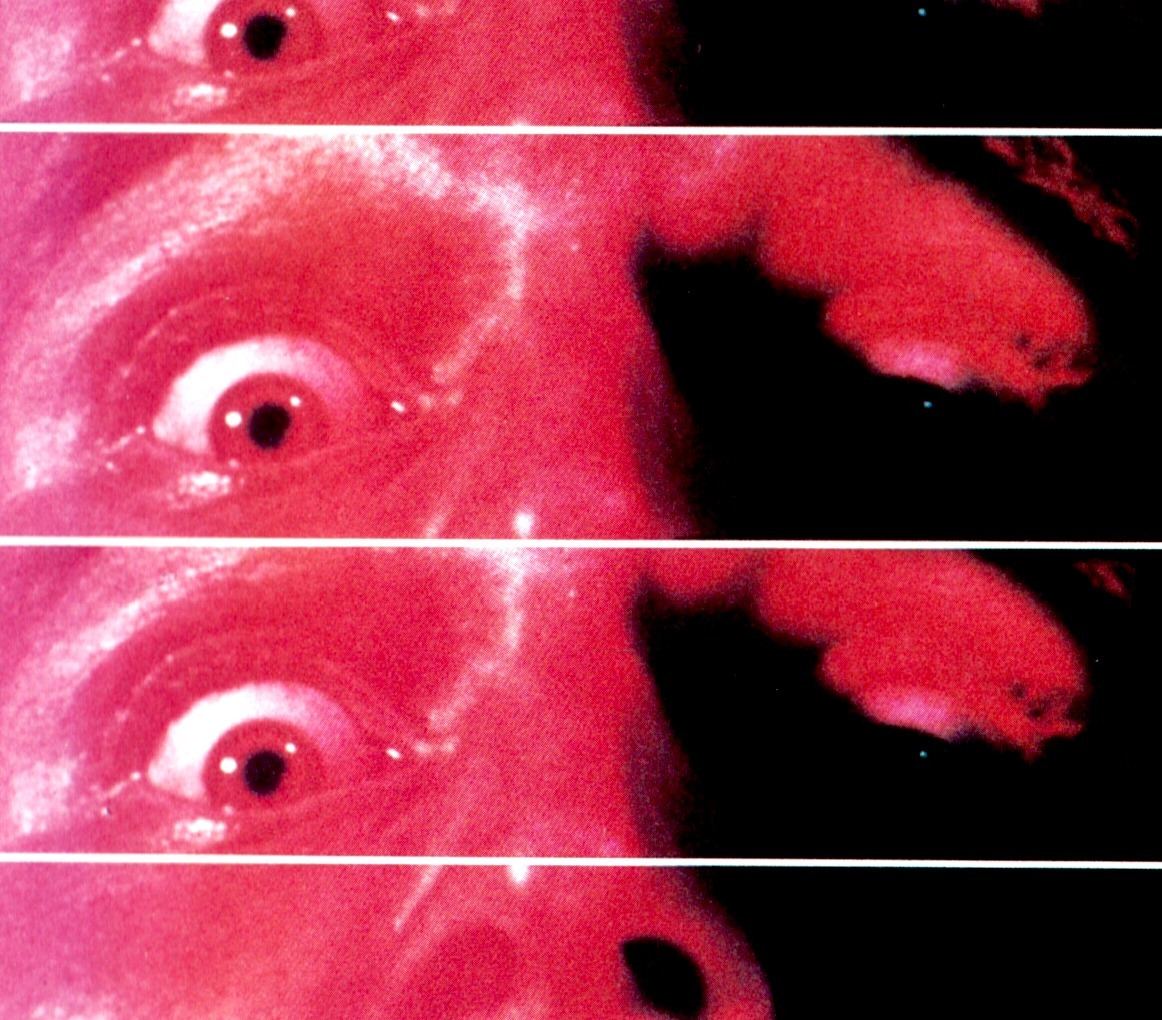
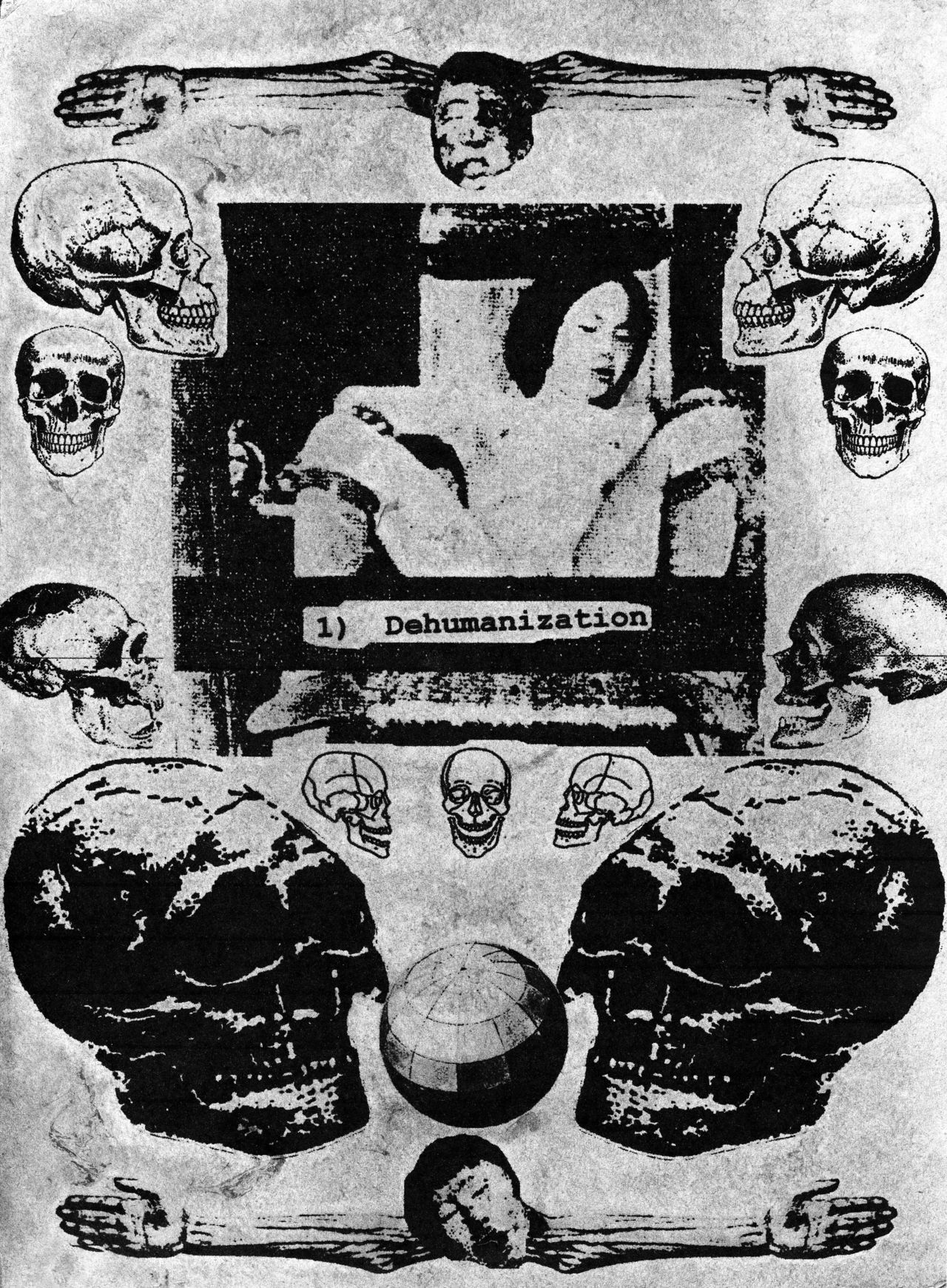



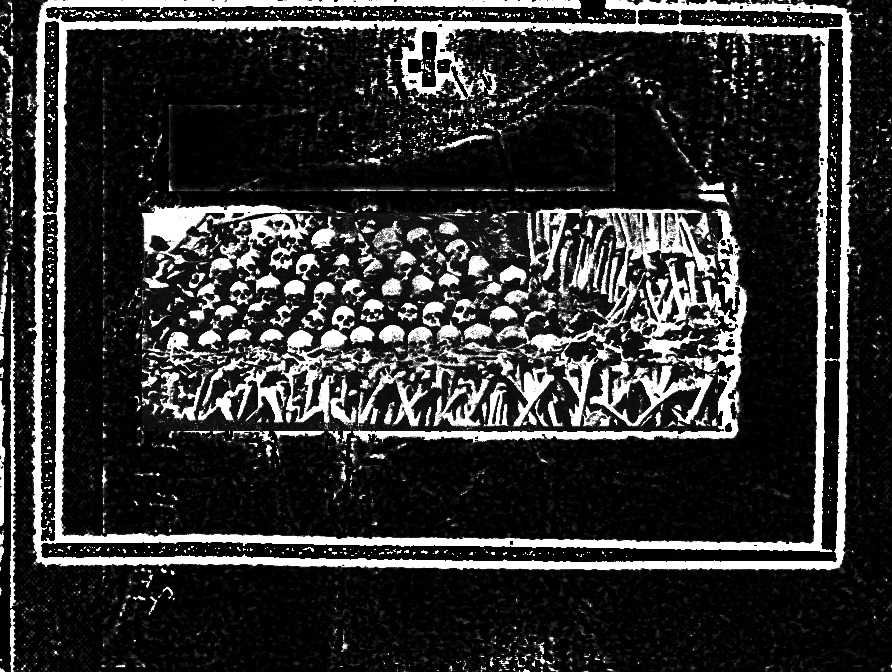
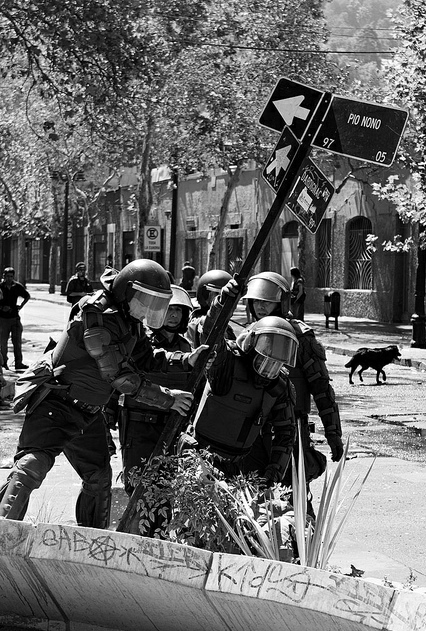
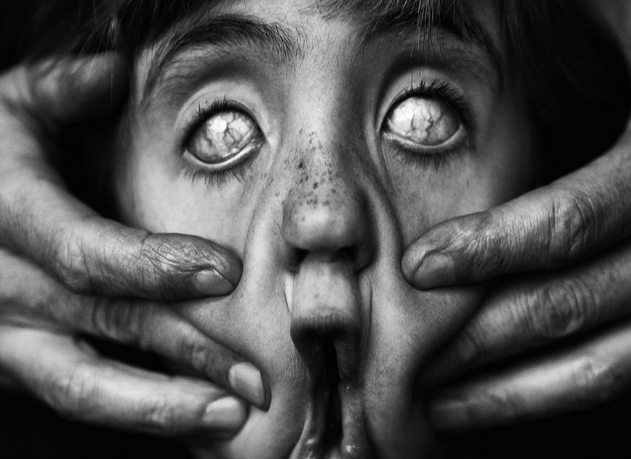


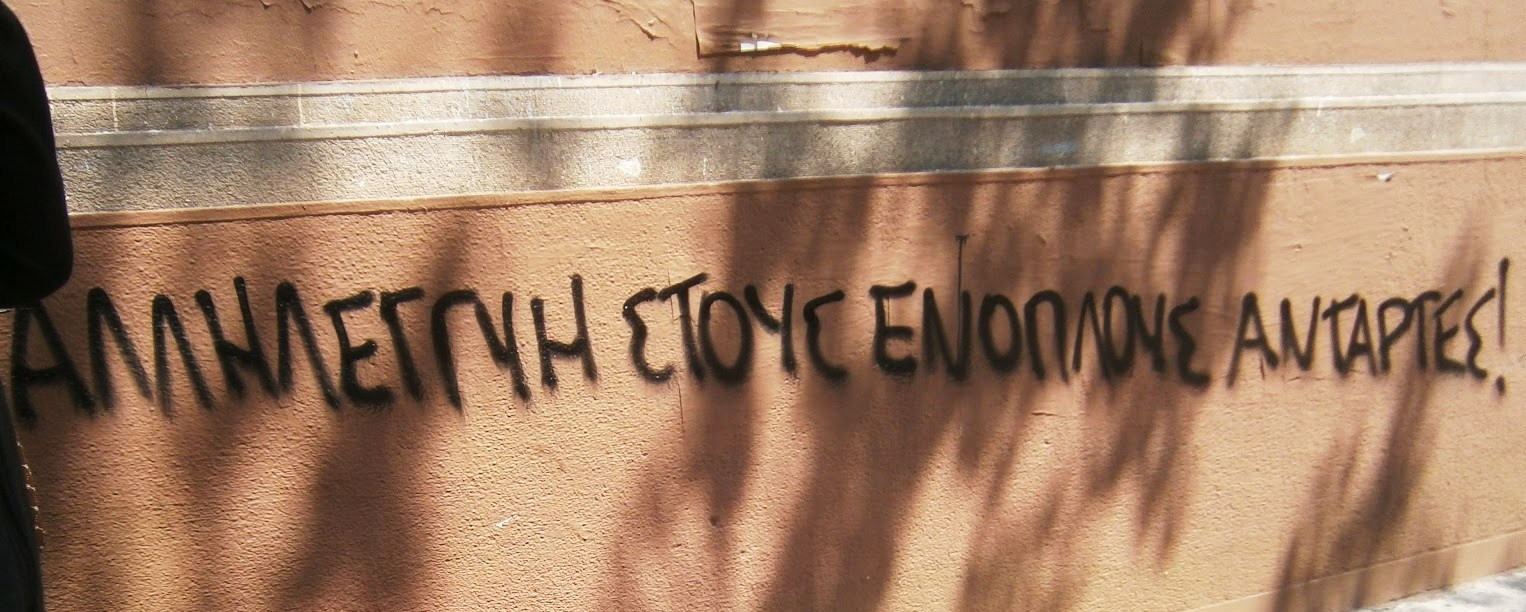

![Eurorepressione - Sulla conferenza a Den Haag sul tema "Anarchia" [corretto]](http://25.media.tumblr.com/tumblr_m0jvngOXtY1qa2163o1_1280.jpg)
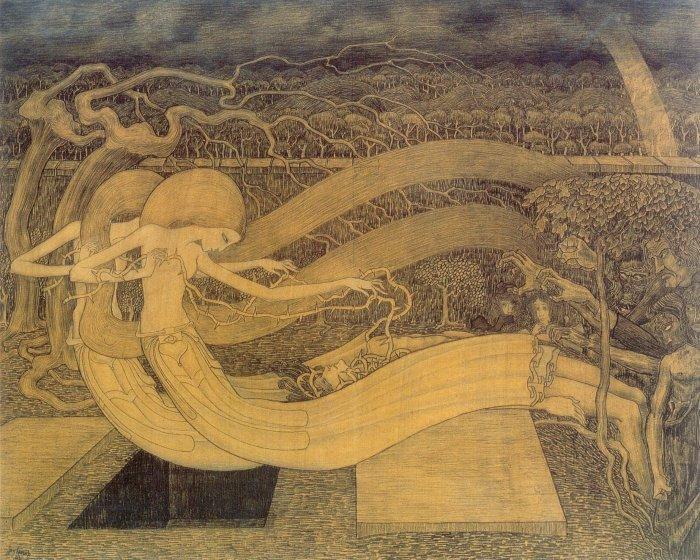
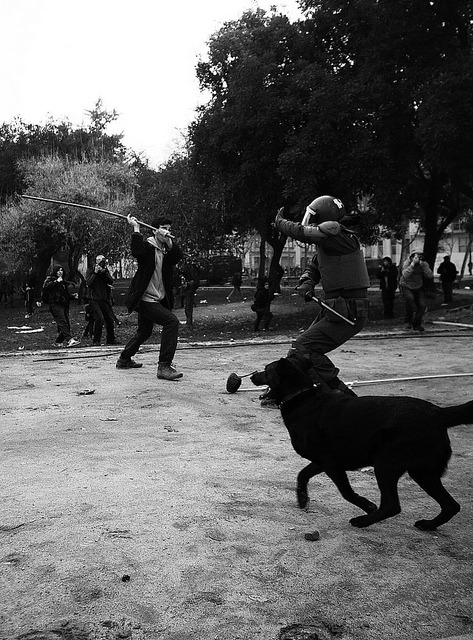
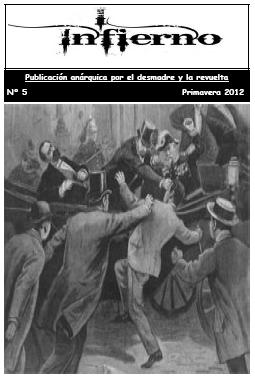
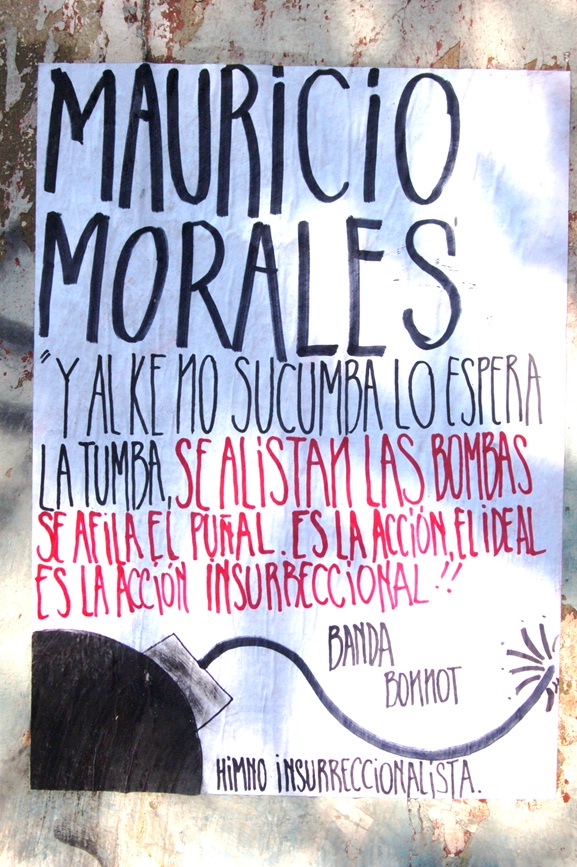
![A tres años de la Partida de Mauricio Morales: De la Memoria a la Calle [Stgo.]](http://metiendoruido.com/wp-content/uploads/2012/05/mmacividad.jpg)
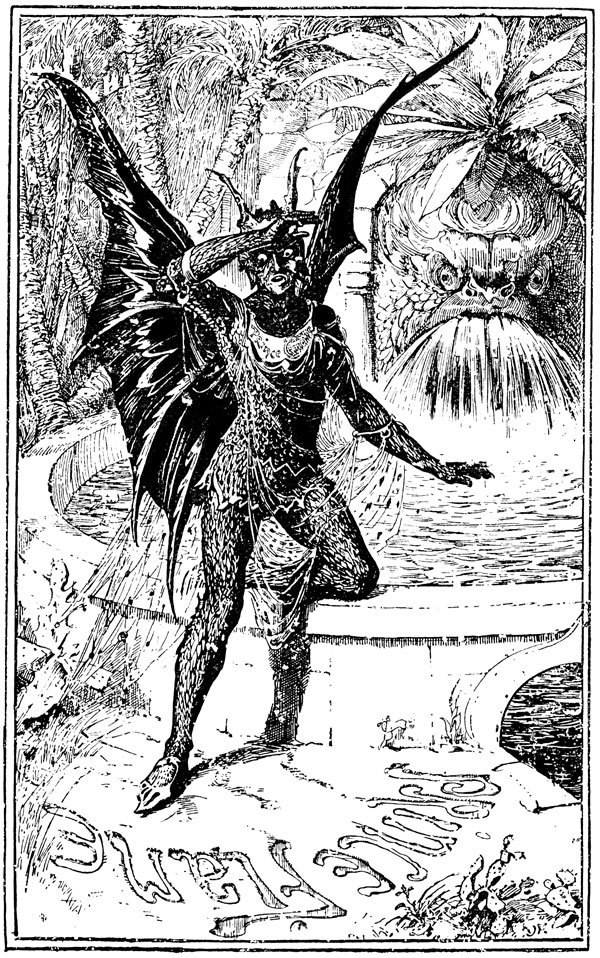
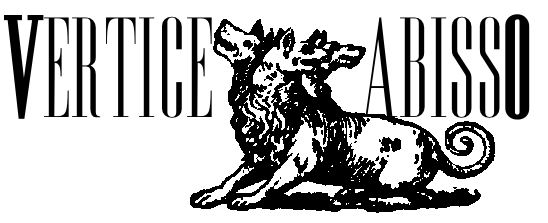



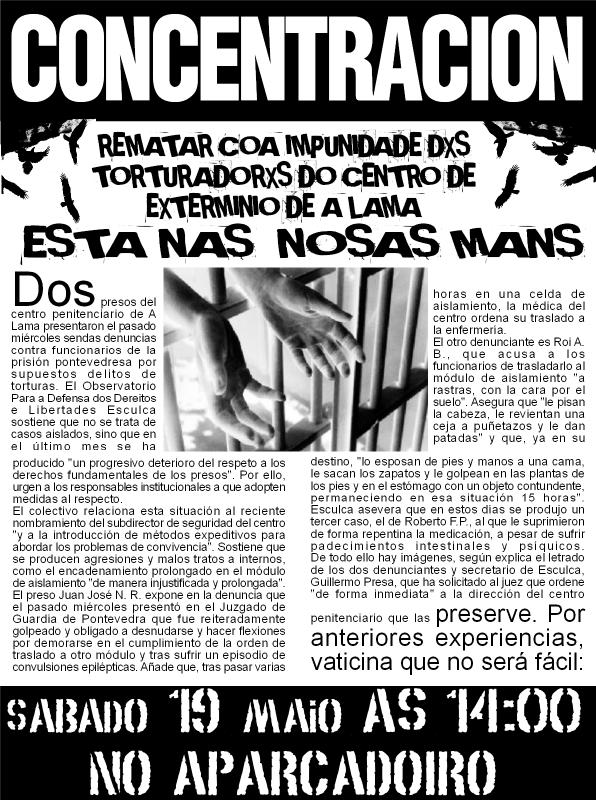

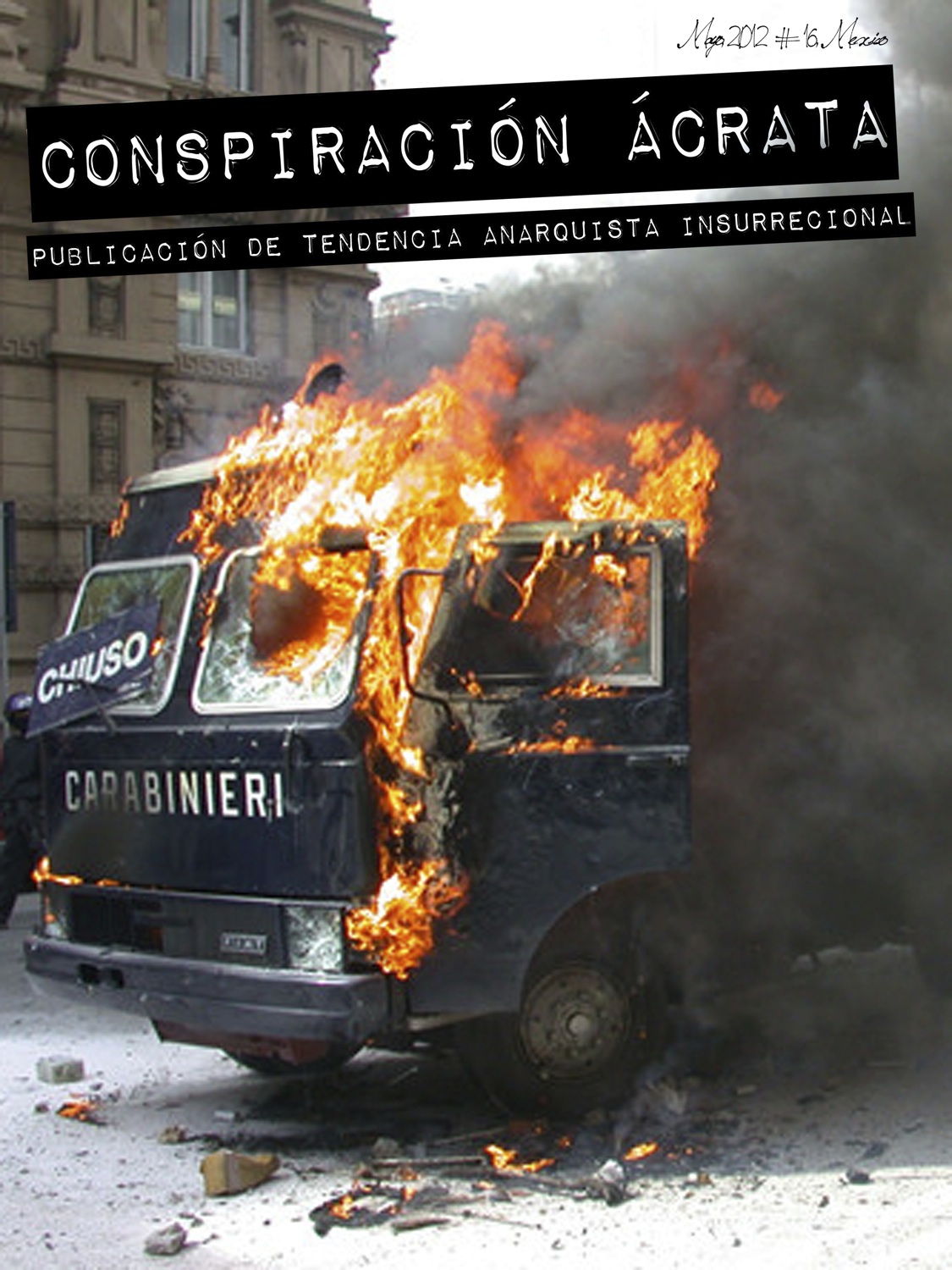

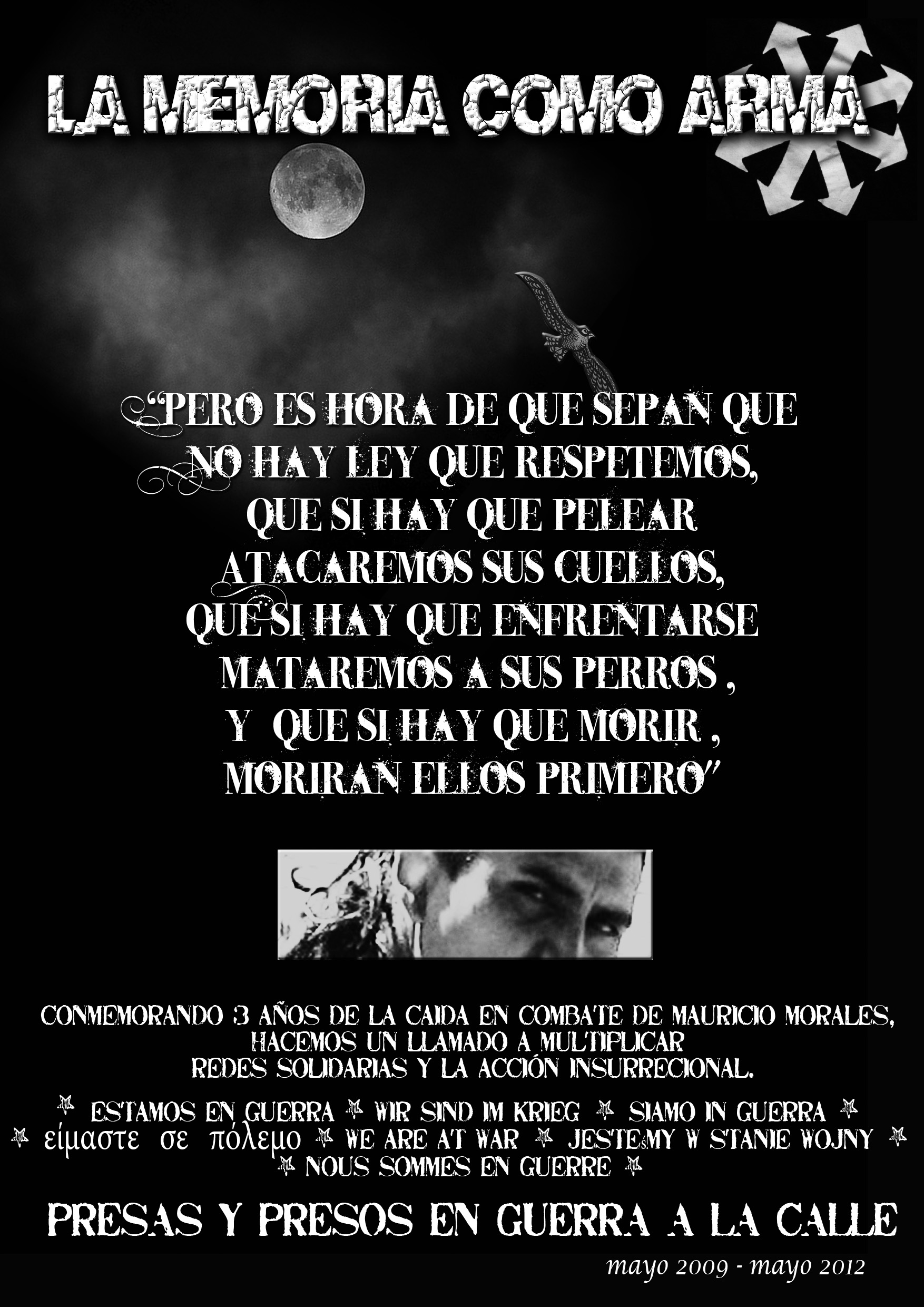
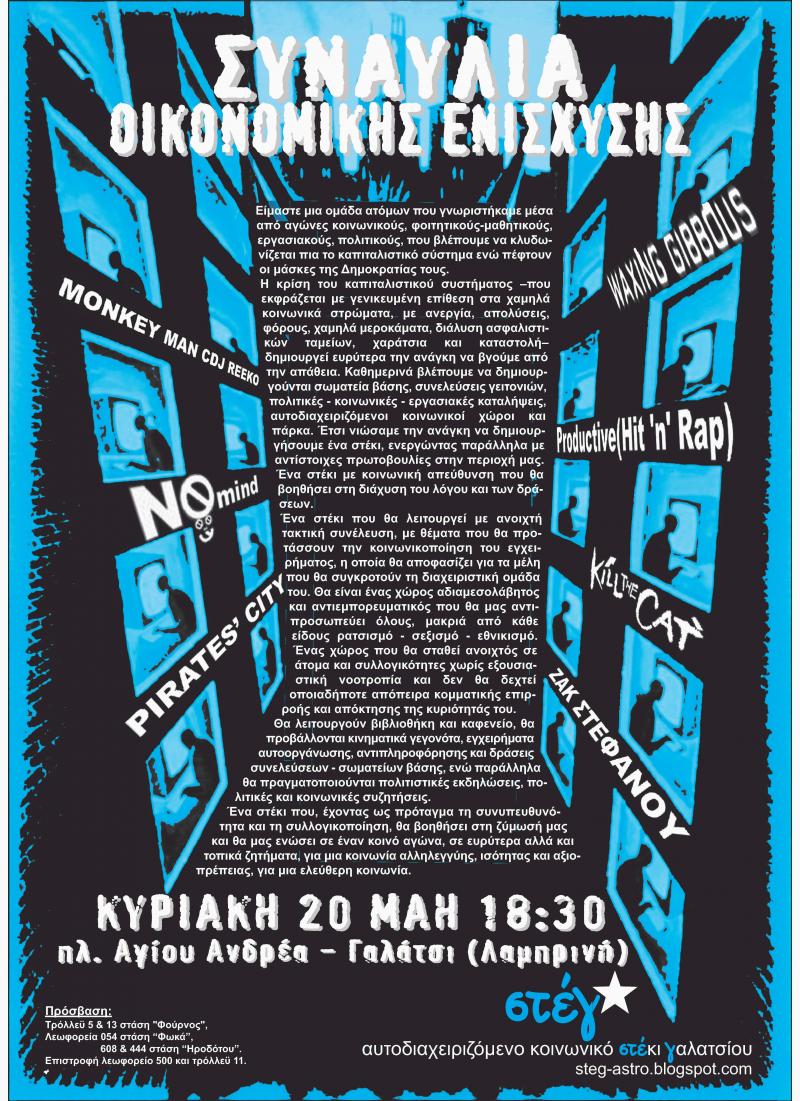








Nessun commento:
Posta un commento